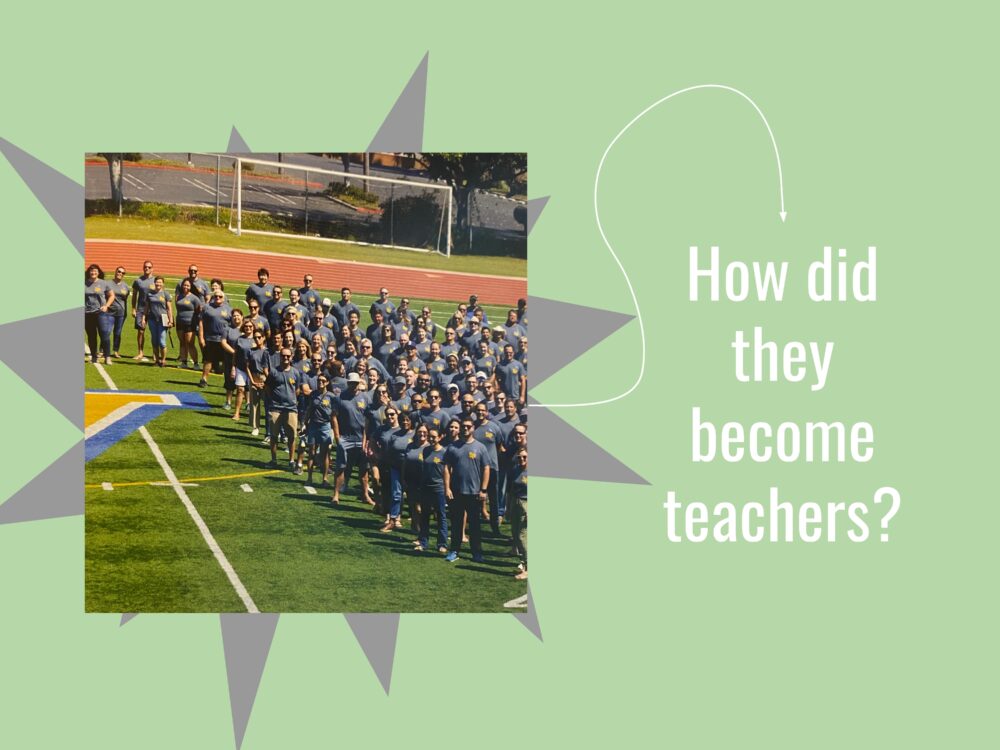
By Charlyne Nguyen
Many students are contemplating what they want to be when they grow up. Some want to be graphic designers, doctors, engineers, nurses, lawyers, architects, psychologists or consider other professions and pathways outside of college.
But if you want to be a teacher, you’re in luck. Here are some of Fountain Valley High School’s teachers’ experiences that’ll show you what you’re in for if you decide to pursue teaching.
Taylor Stamper, English

Why did you decide to teach? And why high school?
“I loved my high school English teacher, Ms. Potter. Her classroom was always such a fun, comfortable place to be. She always seemed so happy to be teaching, so I thought I would like it too!
“Before I went back to school to earn my teaching credential, I spent some time as a substitute teacher in order to help me decide which grade levels I would like to teach. It only took one day in an elementary classroom for me to decide that I’d be teaching high school instead.”
Did the salary affect your choice in any way?
“My parents really pushed me to seek a high-paying career. So, it ultimately took me a bit more time to follow my own instincts and pursue teaching.
Why did you choose the subject you are teaching today?
“I love reading and discussing reading with others. What’s surprising to me is how much more I enjoying focusing on writing, rather than reading, in the classroom now.”
What did you have to do in order to make teaching easier?
“Teaching isn’t easy. If someone knows how to make it easier, please share your secrets! Still, I think it’s the best job, and I actively try to convince all of my students to become a teacher…even if they have other plans.”
What was the process of becoming a teacher like for you?
“I was placed at Fountain Valley High School while student teaching, so I had the best support teachers, Mrs. Zeigler and Mr. Gruca. Still, the next year, my first year of teaching my own classes, was really difficult. I’m still making mistakes and learning, but I’m incredibly lucky to still be able to learn more from my colleagues at FVHS.”
How do you become a teacher? What do you have to do?
“If it’s the same as it was, you need an undergraduate degree, a teaching credential, and time spent student teaching. Depending on the school you and attend and the amount of class you take, it typically takes around 5-6 years of schooling before you earn the credentials you need to apply for teaching positions.”
Sara LaFramboise, English
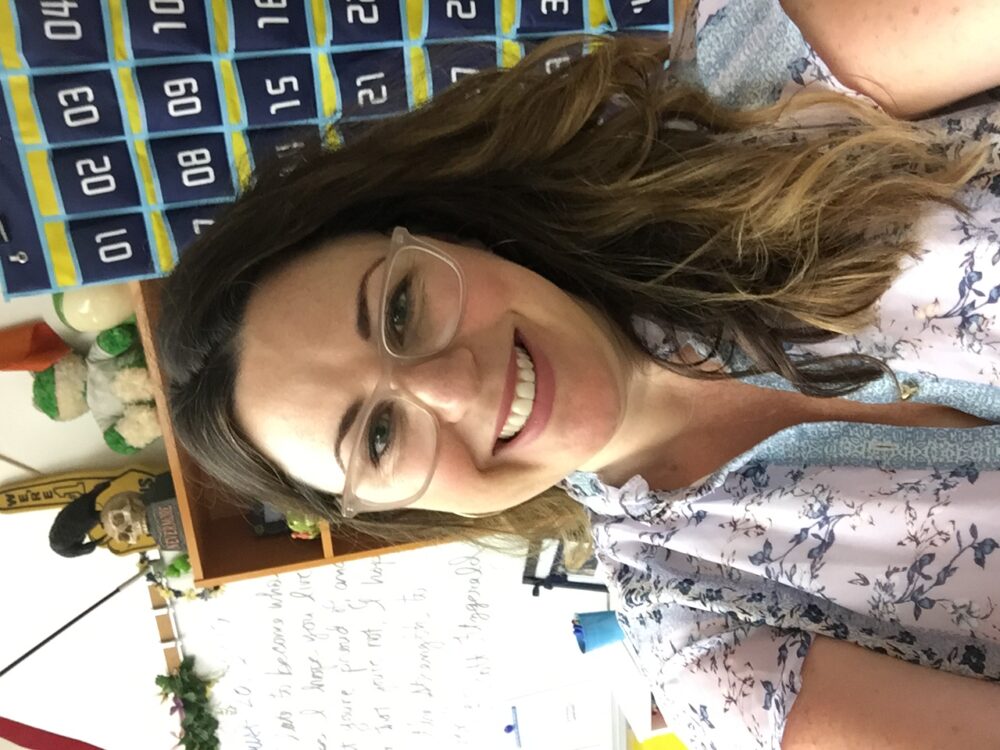
Why did you decide to teach? And why high school?
“I decided to teach because I realized that my interaction with students could be the best part of both of our days. Even as a sub, I realized that I could I learn from them and they from me. I started subbing in middle school and was terrified of high school kids. I came to FVHS to complete my student teaching and just stayed! I knew little kids weren’t for me after subbing elementary a couple times.”
Did the salary affect your choice in any way?
“The job security and great health insurance were pretty strong factors. The only jobs I’d had before teaching (other than subbing) were in restaurants or as a receptionist at a hair salon, so a salaried position was pretty attractive. When I was hired in 2003, HBUHSD was an enviable district to work in. We were, at that time, considered one of the best districts in OC in terms of pay, benefits, and the relationship between teachers, the school board, and district administrators.”
Why did you choose the subject you are teaching today?
“The only job I wanted when I was growing up was to be a writer. It wasn’t that English was my best subject, (it was a toss up between that and history) but it was my favorite. Discussions in English always seemed to permeate to every aspect of our lives. I loved discussing the written word, philosophy, others’ perspectives and experiences, and the magic that a writer can create with words.”
What did you have to do in order to make teaching easier?
“I had to make boundaries. There is always more to do when you’re a teacher. You’re never really ‘done.’ One of the hardest lessons that I’m still trying to learn, especially when teaching from home, is to make boundaries for when I’m working and when I’m not.”
What was the process of becoming a teacher like for you?
“I loved it. I attended Chapman University for my teaching credential and Masters in Education. After being at a big UC, I appreciated the smaller setting of a private school for grad school. Chapman had a strong focus on social justice which has really informed my ideas about my role as a teacher and about education in general.”
How do you become a teacher? What do you have to do?
“I didn’t know I wanted to be a teacher in undergrad. I went to UCSD and majored in Literature with and emphasis in writing. I didn’t know what job that would lead to but I scoffed when people said “oh so you’ll be a teacher.” I just knew I loved the subject. After I graduated, moved back to Orange County, and realized I wanted to teach, I looked into credential programs around here. Chapman didn’t require I take the GRE, which I was pretty happy about, but they did require interviews, which I was totally ok with. Course work for my credential took about a year plus a semester of student teaching. (Some schools require a full year). When you student teach, you are paying for the units for 2 classes (very $$$ when at a private school like Chapman!) and you are teaching 3 classes – it’s very nearly like being an actual teacher. I thought maybe I could pick up shifts at the restaurant I’d worked at on the side but very quickly realized that wasn’t going to happen. Student teaching is no joke. I was scared, stressed, and exhausted, I definitely cried. Like a lot. Not trying to scare you away – I’m just being real. Thankfully, I had fantastic master teachers who guided, advised, and supported me – Mrs. Annalise Attreed and now retired Mr. Dave Penhall were mine. Mr. Penhall had even been my sophomore English teacher when I attended FVHS, which was pretty cool.”
Ashley Houlette, World Language (French)
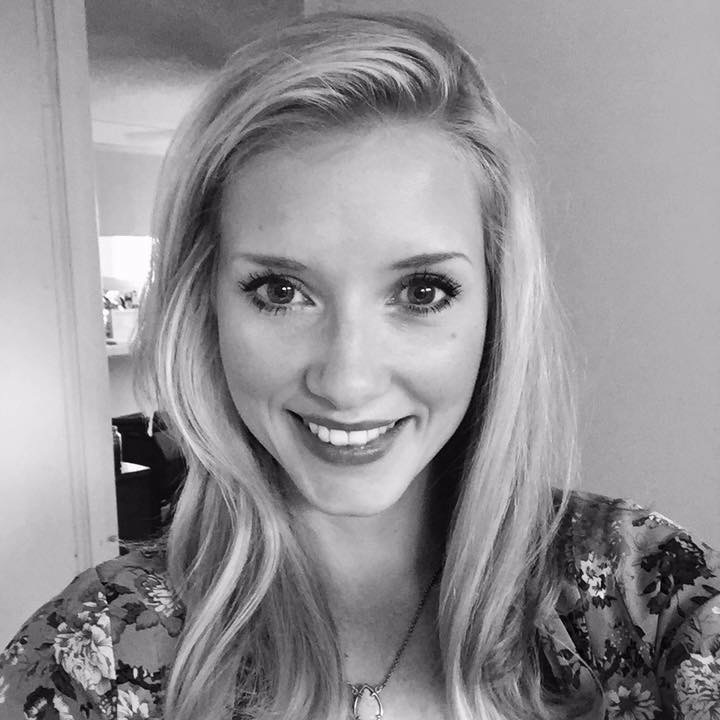
Why did you decide to teach? And why high school?
“When I graduated high school, I was only certain that I wanted to speak languages, connect with people, and explore. When I declared my major in French at under grad, I wanted a practical skill in which I could use my degree and begin my career straight away. So I applied to the school of education at the University of Colorado, and began shadowing French teachers in a variety of public schools around my University. Most of the French programs were in high schools, so I developed an affinity and skill set for high school by virtue of teaching French.”
Did the salary affect your choice in any way?
“When I was a student at university I cared a lot more about studying something I enjoyed and a career I found both interesting, fun, and challenging all at once. I honestly never considered the earning potential of my career. My dreams were not to have expensive real estate or disposable income. My dreams were very much about passion and community and connection.”
Why did you choose the subject you are teaching today?
“When I declared my major in French at age 18, I thought it was because it was the only subject I enjoyed. I now know that it was the carefully crafted environment, not the subject, that brought me joy. I was not there to collect knowledge, but to learn in the truest sense of the word. To learn in a way where I was free to make mistakes, delight in the process, play, laugh, sing, dance, and connect with my classmates and teacher on a personal level. The pain of my adolescent life was on hold and I was completely present with my teacher. I was in flow. My French class was not a to-do item. French was not a hurdle standing between my childhood and my independence. French class was a community, and it completely changed my relationship with learning and education.”
What did you have to do in order to make teaching easier?
“I copied other teachers, mostly. I was also unapologetic about not conforming to practices that felt boring, irrelevant, or ineffective for me and my students. I would smile and nod when veteran teachers insisted I do something their way, and then I did whatever I wanted. I made a lot of sacrifices in my social life in order to sleep enough to have the emotional and cognitive energy to be even remotely effective. Sleep. The answer is sleep.”
What was the process of becoming a teacher like for you?
“Teaching is still so difficult. I think most teachers are work obsessed, because the work is so creative and meaningful, but has nothing to do with us in many ways. In the beginning I was exhausted and overwhelmed one hundred percent of the time. I pretended to be happy and energized every day in the first year. I faked it every day. It was quite the performance. Over time the joy became real. It was in that first year that I quickly realized how contagious my energy and emotional state is, and what it means for students to have a happy, impossibly kind teacher. Impenetrable kindness is the life blood of great teachers, but it is so exhausting.”
How do you become a teacher? What do you have to do?
“There are many paths to teaching, but the basic federal requirements involve earning a bachelors degree and a teaching credential. Every state does it differently, and the requirements vary slightly by university. To teach at the secondary level, you must major in your subject area, complete education coursework, student teach with a master teacher, and pass a few exams. In California this includes a basic skills exam in English and Math called the CSET, among other exams. In the process you pay a lot of money.”
Jennifer Allen, Science
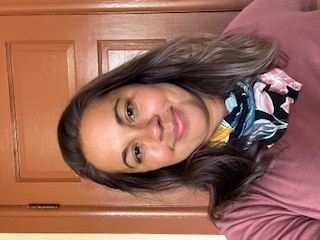
Why did you decide to teach? And why high school?
“Once I had my first child, I realized I wanted more time at home. I also wanted to continue conservation of the environment in some way and thought I could make a difference by teaching it to students. I had experience teaching dance and always felt the most comfortable and productive with the high school age group.”
Did the salary affect your choice in any way?
“[N]o. Its always been a priority of mine to be happy, proud and content with what I am doing with my life. Money doesn’t do any of that for you.”
Why did you choose the subject you are teaching today?
“I have been science minded since a young child. I always tried to help injured animals and loved watching nature shows with my dad.”
What did you have to do in order to make teaching easier?
“Teaching students is easy for me. I am comfortable and not rattled easily. What is difficult is all the time outside of class to prepare lessons and grade. Luckily, at FVHS there are many other amazing teachers that teach the same subject as I do and we all work together to lesson the work load.”
What was the process of becoming a teacher like for you?
“I went back to college to get my degree 2 years after graduating. I went to national university so that I could do all the classes online or at night and then I worked during the day. It was a lot but totally worth it.”
How do you become a teacher? What do you have to do?
“[Four] years of college to get a bachelors degree, then [two] years of teaching credential program and student teaching”
Tony Diaz, Mathematics
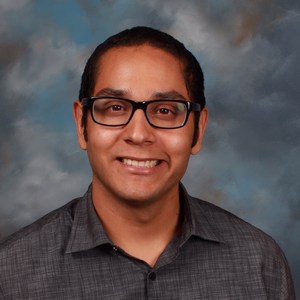
Why did you decide to teach? And why high school?
“I decided to teach partly because of my sister. When I was in the first grade, my sister was in second and was struggling in math. She showed me her math notes, and I was able to comprehend the lesson easily. Since then and throughout the rest of my school years I saw how many struggled in math, so I always liked helping people understand it. As for why high school, I decided to teach high school because I feel I can relate with older students more.”
Did the salary affect your choice in any way?
“No salary did not have any effect on my choice.”
Why did you choose the subject you are teaching today?
“I chose to teach math because I feel math is a subject many struggle with and I feel I can explain things well.”
What did you have to do in order to make teaching easier?
“To make teaching easier, I had to be able to take a step back and see in what ways I can teach the same concept in more than one way.”
What was the process of becoming a teacher like for you?
“Luckily, the process of becoming a teacher for me was simple. When I attended UC Berkeley, I was able to do most of my teaching credential as an undergraduate, which means that I only needed to take one class after I received my bachelor’s degree. While taking this class, I became what is called an intern credential teacher which meant that I have the same responsibilities of a teacher, I just did not have a full teaching credential. While being an intern teacher I had to go through a program in which I had to turn in a portfolio with student work and a video of myself teaching. Once I submitted that portfolio I was approved and was given a teaching credential.”
How do you become a teacher? What do you have to do?
“The traditional way to become a teacher is by first getting your bachelor’s degree. After you get your bachelor’s degree, you go on and decided what type of teacher you want to be. You then apply for a teaching credential program that relates to the type of teacher you want to become. Once you finish the program you go ahead and turn in a portfolio to the state of California teacher credential and wait to be approved. Once approved you become a teacher, but even then you must go through another one to two-year program to have your credential cleared which means you have them going forward.”





